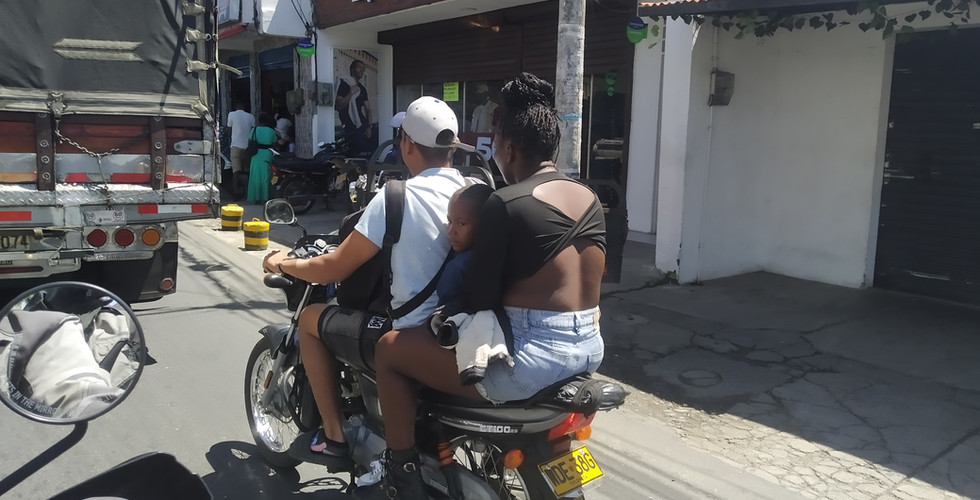Colombia IX: Such Sweet Sorrow
- Aug 3, 2025
- 7 min read
Returning to Colombia was like coming home. In fact, for Bolívar it really was. Driving north to Pasto and beyond, roadside churches were familiar, as were particularly nice bends and busy little towns. These were packed with tuk-tuks, pick-ups and countless scooters carrying fathers, mothers and toddlers, and sometimes acting as the vanguard, sleeping babies spreadeagled across the tank. In La Venta we found a quiet spot to catch our breath: a hacienda in the countryside north of Popayán. Drinking coffee high in the tower of the small chapel, we gazed contentedly over the empty lawns and thought how nice it was to be back. Further north in the Cocora Valley, Bolí swooped in and out of tunnels, one of them supposedly the longest in Latin America. Sailing down the mountain in serpentine curves, we were plunged into darkness and sent packing into the light, only for the whole thing to begin all over again minutes later. Standing sentinel on every emerald slope were Colombia’s famous wax palms, the tallest in the world. It was one of those unforgettable rides, bursting with rollercoaster excitement but minus the sickening lurch in the stomach. In short, an afternoon spent in paradise.
We were coming to the end of our journey. It was quite a bit later than we’d expected: seven and a half years had passed since we first set out on an embarrassingly-overloaded Pferdi. There was no official deadline. Aptly named, the Himalayan would have kept going, and going, and so in theory, could we, but we’d seen more than enough of this part of the world. It was time to find a buyer for Bolívar. The Colombia WhatsApp group we joined in 2024 yielded no responses to our ad. It was a strange one, the complete opposite to our support group in Mexico which had served us well all the way to Peru. Now we were the only ones posting, apart from the owner of a Peruvian Moto Posada who announced and hosted visiting riders with a great many thumbs-up and even more aplomb (Bienvenido a Juan Carlos desde Medellín!). So, we joined the South American Riders WhatsApp group and a young Hungarian responded.
It couldn’t have worked out better. He was working at a hostel in the coffee district and we’d been planning to stop there anyway. He wasn’t an experienced motorcyclist so our little moto would be perfect for him. The test ride went well enough though Fran looked more than pained at the sound of grinding gears. The purpose of the purchase was for a journey south, though details on the where and the when were vague, if non-existent. I almost said just point Bolívar south and he’ll bring you there himself, but never got the chance. The hostel was an upmarket affair in lush and blossoming grounds. The meals were communal and excellent, the usual Colombian fare with the not so usual home-baked bread. There were four other guests, one French, one German and an English couple, all travellers like ourselves. Whenever possible, Fran gave lessons in the gentle art of Himalayan maintenance while I hung out not wanting to think about someone else riding our boy.
We hadn’t been in a hostel environment in ages and while an idyllic spot to spend a few days, we still preferred the smaller hotels and guesthouses we usually stayed at. It’s easier to rub shoulders with the locals in a hotel, and since most encounters there are temporary, people are more inclined to strike-up conversations, which they do. We’ve had tons of impromptu, entertaining exchanges in elevators, at the breakfast buffet, in the parking-lot and outside on the street while packing-up a patient Bolívar. It’s a simple matter of what you’re looking for. For local colour, hang-out, and stand-out (as the worst dressed), in a hotel; for a shot of international fraternization, seek out a hostel.
Click Arrows For Slideshow:
Those last days of riding, the distances weren’t exceptional but the hours were long due to truck traffic in the mountains. It was a series of painfully slow climbs with no passing lanes. Every time we’d overtake a truck, there were another fifteen up ahead. Our situation now wasn’t all that different from our first time in Colombia. While Pferdi and his sidecar needed a week to set-up a pass, Bolívar took at least three days. Still, it gave us time to smell the exhaust fumes. Colombia was however, attempting to find solutions for cross-country traffic but they would come at the expense of nature. We were constantly in awe at the on-going construction of huge, elevated bridges. Like alien ships on stilts, they lay claim to the jungle, but in spite of some creeping mould, progress had been made. By-passing the city of Ibagué, we entered a national park. What a surprise. The road was a relaxing one-way only, up, with passing lanes at intervals. The views were Colombia in all her lush and verdant glory. Downward curves through jungle, climbs under pendulous vines and banana leaves, canopied passages of Spanish moss and mountainsides covered in Cecropia trees, like silver forests of open umbrellas. I wanted more than anything to tell that Hungarian boy to go find his own way south.
Our last “road night” was spent in Girardot. It was 33C and the heat bounced off the blinding white walls. I climbed the outside stairs to our room like an eighty-five-year-old in a Michelin Man suit. Bolí was wisely settled in a shaded corner of the courtyard behind the pool. Across the street a restaurant with a tiled courtyard, fountain and white-coated waiters waited. They were playing Cuban music. Sometime you wonder just what you did to deserve such a perfect evening. In typical Colombian culinary fashion, we ate everything but the moo, and the oink, even the it’s-so-bad-it’s-good Chicharrón. There were also plantains, beans, arepas, and the crowning glory: a fried egg. Our hearts were horrified at the onslaught, but hey, what a way to go!
Traffic was surprisingly light on the ride over the mountains. Even so, Fran was driving like a man on a mission: passing trucks with outsized enthusiasm, treating the double yellow lines as mere suggestions and a wife flapping in the wind on the back.......exactly like he’d done in 2019 when we left Bogotá for the south. I remember that day perfectly: Pferdi cresting a hill, hovering several inches above the tarmac, on the wrong side of the road, and at the bottom a roadblock, with groups of both army and police. It was a long way down and they were all waiting for us. Oh, but we’d plenty of time to contemplate our sins. We got away with it that time, in all likelihood because of Pferdi. It’s hard to be serious when scolding a sidecar, but I didn’t want a repeat, especially not on our last day. Cajolery (“Let’s relax and consider the beauties of the forest”) and threats (“I’ll make you pay the ticket yourself”) however, failed to make an impression. The cavalier attitude continued until we rounded a corner and immediately got waved over to a checkpoint on the side.
It was a beautiful morning. Rays of sunshine slanted through the thick vegetation and the road ahead rounded a bend opening to a vista of sapphire sky and green valley far below. Our cop, in camouflage, made us wait. We took off the helmets. I settled my face into an apologetic and very repentant expression. It wasn’t hard. The stiff upper back in front of me though, was having a hard time finding the correct countenance. The smoke coming out of the ears wasn’t helping. The cop made several visits as we sat there, mostly to question our utter disregard for las líneas amarillas dobles. He was very cross. I sighed, wondering how difficult it’d be to find out how to pay a ticket on a bike that would no longer be ours. Finally, our interrogator took out his phone, I assumed to show us the dreaded fine, but no. I found myself staring at a photo of a young man in a hospital bed, with his plastered leg in traction. After a “This could be you” lecture, we were sent on our less-than-merry way. Again, we didn’t deserve it, and I’d nothing but admiration for those young policemen who must be sick to death of scraping the remains of two-wheelin’ nutjobs, and their victims, off the road.
We were back in Bogotá, by now quite used to the traffic even if we did find ourselves driving several hair-raising blocks down the bus lane. I’d contacted the Royal Enfield dealership in Zona T to find someone who could help with the paperwork for Bolívar’s sale and was put in touch with “Don Elfo”. We met him the following day: silver-haired, distinguished, didn’t speak English, and certainly not deserving of the name “Mr. Elf”. There were three seller’s documents: Transfer Form, Sales Contract and a Seller’s Mandate, whatever that was. Fran signed, got fingerprinted and then it was off to the notary which didn’t take long. We were back just in time for the arrival of Bolívar’s new daddy.
The deed was done. We said good-bye. For almost thirty-eight thousand kilometres he’d been our home. It felt like we were missing a limb or something very important. At the same time there was an unexpected sense of freedom, unencumbered now by traffic troubles, insurance policies and having to keep our noses clean on Bolí’s home turf. The sun was setting on our way to the airport, bathing the interior of the worn-out taxi in an orange glow. It was the most relaxed drive I’ve ever had in this city. If we die now, I thought, at least it won’t be our fault. I began to look ahead. I loved Colombia, I loved South America, I even loved Bogotá, but this was only an end, not the end. And there always has to be an end, right? Because without a finish line, how can you cross over to the new beginning?
Click Arrows For Slideshow:
“Parting is such sweet sorrow”. Romeo and Juliet


















































I'm so happy that your final time in Colombia was so lovely. I will miss reading about your time in Latin America but look forward to your next chapter my friend. Glad that Bolivar found a home. You two are an inspiration to live life to the fullest. I'm thrilled to have been along for the ride.
Sigh. I shall miss your updates on your grand adventure! Thank you so much for allowing us all to live vicariously through your very entertaining and descriptive words. You two will forever be a major inspiration to me for how to really live one's best life. Much love to you both! Now go find a publisher! 😘